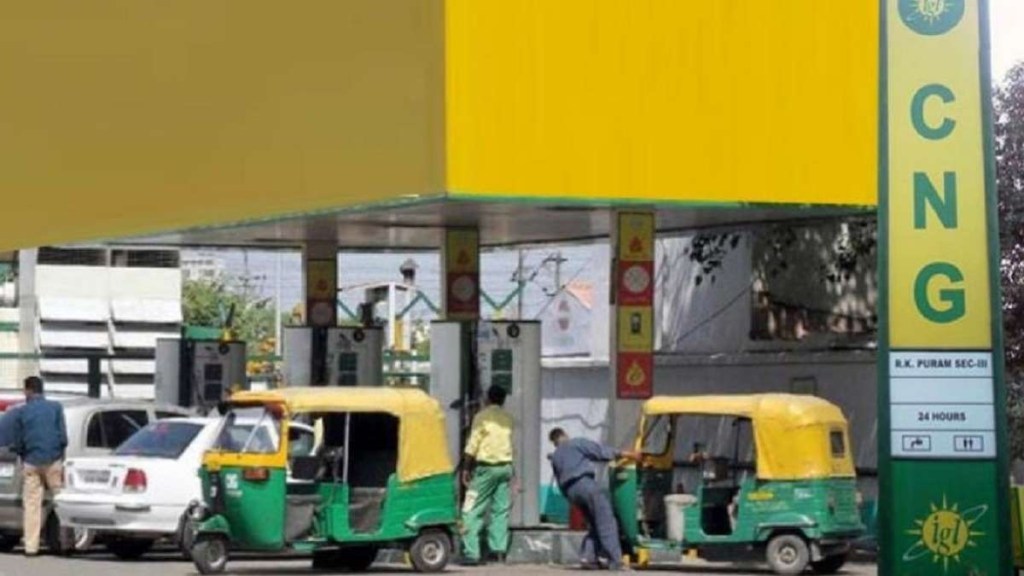While two successive cuts in allocation of cheaper APM gas to city gas distribution companies (CGD) have caused their stocks to fall steeply, analysts expect another price hike for compressed natural gas (CNG) for these firms to sustain their margins.
State-owned GAIL India, the nodal agency for domestic gas allocation, has decided to cut Administrative Price Mechanisms (APM) gas allocation sharply from November 16, by 20% for Indraprastha Gas and by 18% for Mahanagar Gas from their previous allocation. This cut has come over and above the cut of 20% effective October 16.
The stock price of IGL on Monday plunged by 20% to Rs 325.05 while that of MGL declined by 14% to Rs 1,133.55.Shares of Gujarat Gas also declined by 7% Rs 453.35 after the reduction in domestic gas allocation. In the last one month, both IGL’s and MGL’s stock price have fallen over 28% while that of Gujarat Gas has fallen by 19%.
“This (de-allocation of APM gas) would reduce blended allocation for the priority sector from 57% to 46% (which was reduced to ~57%, from 70%, effective Oct 16),” said ICICI Securities. “The previous cut in allocation required a price hike of Rs 4.4-6.2 per kg in the CNG segment for the CGDs which they haven’t taken yet. Now however, a further additional price hike of Rs 2.5-2.8 per kg could be required to maintain margins assuming no reduction in costs from some other source.”
Motilal Oswal estimates that after the recent de-allocation, CGD companies are only receiving 35-40% of gas for overall CNG requirement. The brokerage highlighted that the extent of the hit is material, and suggests a Rs 5-6 per kg price hike needed in CNG segments to sustain CGD companies’ margins.
Analysts believe that a price hike by CGDs (in CNG segment) at one go would be difficult, potentially impacting volume growth or margin pressure.
The sudden reduction raises operational challenges for the CGDs in terms of arranging appropriate sources to compensate for the shortfall, analysts at PL Capital say. “This is a complete U-turn from 2014 when both CGD and PNG-domestic were allocated priority sector status for allocation of APM gas,” it said.
The reduction is likely to impact the profitability of the CGD companies. The upcoming elections in Maharashtra and Delhi are seen further limiting their ability to pass on cost increases to consumers at once.
“While the Maharashtra elections will be over in November, after which MGL should be able to increase prices, Delhi elections are due in February 2025 that are deferring IGL’s potential price hike by several months,” said Motilal Oswal.
Currently, discounts against diesel have narrowed drastically in major cities, as per analysts. “Hike in CNG price would have a debilitating impact on conversion from diesel, thereby adversely impacting volume growth of the companies,” according to PL Capital. The brokerage noted that gradually, going forward, the APM allocation may only be left for the PNG-domestic portion and CNG may be left out of the current priority sector definition.
As per guidelines by the oil ministry, domestically produced APM natural gas is to be allocated to city gas distribution companies for priority segments, specifically domestic PNG and CNG (transport). The policy states that the supply of domestic gas to CGD entities will be made only up to the quantity available and allocated to GAIL (India) limited for these segments.
IGL and MGL on Friday said that there has been further reduction in domestic gas allocation to the companies which is likely to impact their profitability. “The revised domestic gas allocation to the company is approx. 20% lesser than the previous allocation which will have an adverse impact on profitability of the company,” IGL said in an exchange filing. “The company is exploring all options to address the issue.”
Allocation of APM gas to MGL has been reduced by 18%, compared to October 16 APM allocation. “This being a major reduction in allocation, will have an impact on the profitability of the company. To bridge this shortfall, MGL is exploring options of sourcing gas through domestically produced High Pressure High Temperature (HPHT) gas, New Well/ Well Intervention gas (NWG) from ONGC and benchmark-linked long-term gas contracts, so as to continue to provide gas to its customers with price stability,” MGL said.
CGD companies are now expected to issue Regasified Liquefied Natural Gas (RLNG) purchase tenders to meet requirements for December.
“In the near term, the demand will have to be met through spot LNG which is currently available at around $13-14/mmbtu, and in the medium term through Term LNG or HPHT gas,” said Girishkumar Kadam, Senior Vice President & Group Head – Corporate Ratings, ICRA. “To maintain the contribution margins at earlier levels CGD entities would have to increase the retail prices of CNG by about Rs 8.5-9.0 per kg. The expected price rise may result in slower growth in CNG vehicle registrations, which have been the key driver of CNG sales volume for the sector.”

